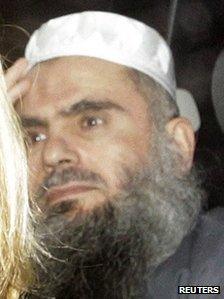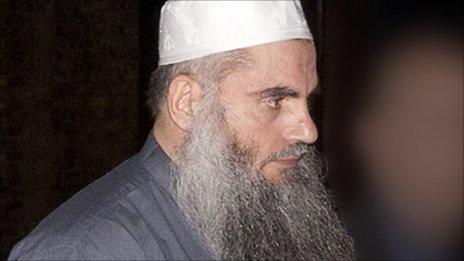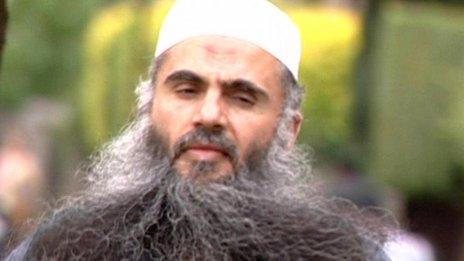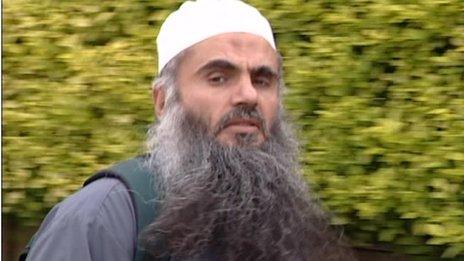Abu Qatada case: Judge details landlord's privacy order
- Published

Abu Qatada was driven to the unwitting landlord's property after his release
A High Court judge has revealed why radical cleric Abu Qatada's landlord was given anonymity after he was repeatedly contacted by journalists.
In a written judgement, Mr Justice Tugendhat said the landlord's human rights entitled him to the right for "respect for his home and family life".
He explained reporting restrictions following a hearing in London.
In a statement the landlord said he had not realised he had rented the home to the bailed preacher's family.
Abu Qatada was released on bail, external earlier this month, despite government protests he remained a threat to national security.
In January, he won an appeal at the European Court of Human Rights against the UK government's plans to deport him from the UK to Jordan - where he had been convicted in his absence on terror charges.
The 51-year-old had been held in custody for six years.
When he was released, he was taken to where his family were living.
But in the property owner's written statement - parts of which were released along with the judgement - he said he had believed he had let the house to a "mother with four children".
The man, who cannot be named for legal reasons, told the judge journalists contacted him on 15 February with images of Abu Qatada at the door of the house.
In the statement, he said the reporters kept asking him questions.
"I did not know that the family were related to Abu Qatada. I did not know him. I told them, 'I do not have the name on the contract. I have the name of a mother with four children'," he said.
He added: "I became panicked ... I can't live like this with people chasing after me and phoning and knocking at my door. I don't want my family dragged into this."
Intrusive scrutiny
He said he could not allow the family to stay if the furore continued.
"I will have to serve notice," he said.
The judge said reporting restrictions also stop the publication of the landlord's name and address.
This follows an earlier injunction on the same issue, handed down by another judge on 15 February.
At a hearing on 20 February the landlord's lawyer Leonie Hirst told the court her client had become "the subject of intense and very intrusive media scrutiny", despite him not being at fault.
Abu Qatada has never been charged with a criminal offence in the UK but ministers have described him as "extremely dangerous".
UK authorities have previously said he had given advice to those who aimed "to engage in terrorist attacks, including suicide bombings
Under his bail conditions, he is banned from attending a mosque, leading prayers, publishing any statement, or meeting any of 27 named individuals. Use of a mobile phone or the internet is also prohibited.
The government has said it is committed to striking a deal with Jordan to deport the preacher.
- Published17 February 2012

- Published26 June 2014

- Published9 May 2012

- Published15 February 2012
- Published13 February 2012